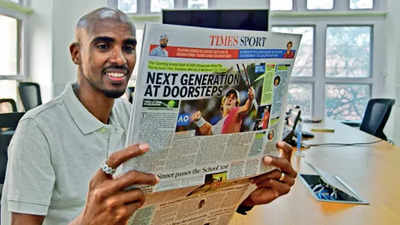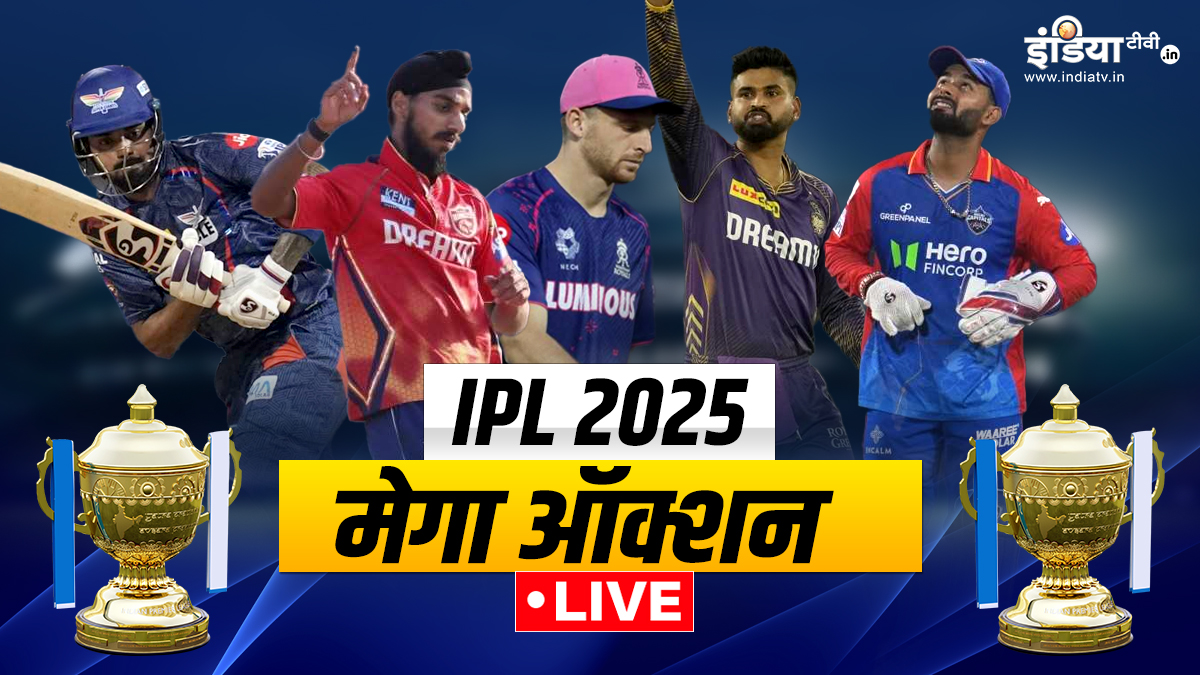They say, all supermen wear capes. Some wear bibs. Mo Farah is one of them.
One of only two athletes to win the 5000m and 10,000m gold at successive Olympic Games (London 2012 and Rio 2016), the 41-year-old visited the Times Of India office at CST in his capacity as an event ambassador of the Tata Mumbai Marathon, which celebrates its 20th edition this Sunday.
Saif Ali Khan Health Update
Go Beyond The Boundary with our YouTube channel. SUBSCRIBE NOW!
During the course of an hour-long conversation, Farah spoke eloquently on a range of issues, from being trafficked from Djibouti to Great Britain as a nine-year-old, his journey to becoming an all-time great track runner, his transition to becoming a marathon runner and who he sees playing Mo Farah if a biopic were made on him. Excerpts.
Since you’re here as event ambassador for the Tata Mumbai Marathon, what’s your daily fitness routine? Do you still run?
Firstly, thank you guys for welcoming me to India. It’s been an amazing trip to Mumbai. It’s my first time. It’s great to see the Tata Mumbai Marathon and how changes have happened over the years. It is celebrating the 20th edition, which is important for all of us. After I stopped running, my purpose is to be able to give back to others, work with charities, show people through sports what we can overcome.
Now, I just go for a run to clear my head but really not much more than that. I do play a little bit of paddle with my family. My kids are quite active, so often I will run with my kids or go on family runs. But compared to someone who was running 120 miles a week, I’ll probably say I’m just running 10% of it or not even that (smiles).
The world knows you as a great long-distance runner, but we recently got to know you’re a pretty talented sprinter as well. There was a story that came out about you chasing down these thieves who snatched your phone and were trying to escape in a van. Tell us what happened.
I was doing a running session with my wife, not too far from where we live. We were doing a hill session. Around that time someone tried to take it, and my wife said to me, “Something’s going on there.” So, I ran down to the bottom and dealt with the situation. But yeah, I’d probably say I’m not as fast as I used to be, not anymore.
How different is the UK right now with all the immigrants and all those problems from when you started and chose to live in it?
The situation we’re in the UK or throughout the world, there are always changes, and they will continue to be a lot of changes. But for me, I was very grateful that the country embraced me with both hands as a young boy. Coming to the UK wasn’t easy being trafficked as a child; I was in a difficult situation. But my PE teacher and the people around me recognised my talent and embraced me. If I didn’t have that opportunity, I would never become this man.
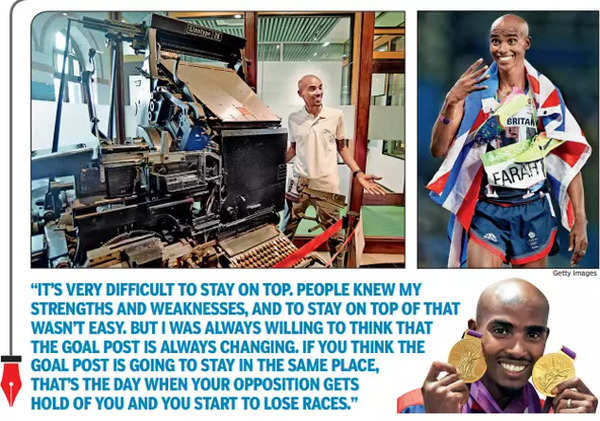
You’ve won all the possible medals in 5000 metres and 10,000 metres, but when it came to transitioning to the marathon, how difficult was it?
I was lucky to have the career I did on the track. So for me, when I moved to the marathon, I wanted something to change. I wanted something that could inspire me, something that I was hungry about. It was about trying to motivate myself. The transition to the marathon was hard. I won my first major marathon at the 2018 Chicago Marathon with a British record of two hours and five minutes. But it was challenging because you got to understand the event and know how you can win.
At all times in a marathon, the more you’re on your feet, the more things can go wrong. But perhaps I didn’t quite understand the marathon as much as I did the track. On the track, if you do 10,000 metres, you can do another 10,000 three-four weeks later. You can recover so quickly after a 5,000 metres race that if you do a 5,000 this weekend, you can do it the following week because you can recover quickly. But in a marathon, you don’t quite recover. It takes six months for my body to recover fully, and that was the frustrating part for me.
There will be around 60,000 people running in different categories of the races on Sundays. Have you ever seen this kind of running group?
I’ve seen it competing at the London Marathon. It’s one of the biggest marathons in the world. If you look at this race (Mumbai), you know we’re capable of (having more runners). How many millions live in India? I think we have to change the attitude, the belief, the system, them viewing and bringing in people because I believe the power of sports can change many things. The power of sports can change the lack of languages, characters, and colours because all you want to see is people taking part, having fun. It doesn’t matter what they look like or what language they speak or where they come from. And I think that’s the power. And we do recognise that, particularly in the marathon happening, that can bring in the community and change society.
For me, it’s incredible to be an ambassador for the Tata Mumbai Marathon. As an ambassador, I think it’s important for us to understand the event. That’s why I came to India, Mumbai particularly, I believe what they’re doing is incredible. We’re celebrating the 20th edition. If we were talking 20 years ago, someone would say, “You are going to start a marathon here?” It shows people, if you’re given that opportunity, we can make the most of it.
From the 2011 World Championships to the 2017 World Championships, with two Olympics in between, you were on top of your sport. What sacrifices does a person have to make to stay on top for such a long time?
It’s very difficult as an athlete to stay on top year after year. The reason why it is harder is because if one knows what piece I’m writing today, they know your style of writing. It’s the same as running, where people knew my strengths and weaknesses, and to stay on top of that wasn’t easy. But I was always willing to think that the goal post is always changing. If you think the goal post is going to stay in the same place, that’s the day when your opposition gets hold of you and you start to lose races. For me, I was always a bit hungrier.
At the same time, I had to understand my opposition, what they’re doing, how they’re doing it, who’s going to be my threat, who’s going to be my danger, and then keep grafting, keep believing in yourself. For me, after 2017, it became a little bit harder to motivate myself. And that’s one of the reasons why I moved to the marathon to find that new goal, new ambition, new challenge.
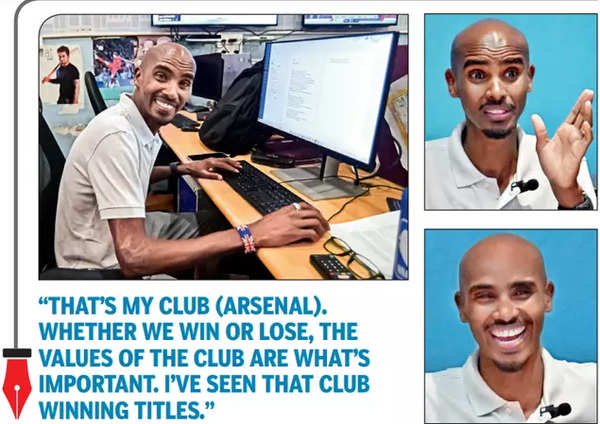
Do you think you could have done something better in the marathon than your personal best of 2:05:11?
I believe in being honest. You could say that the shoe technology is moving, new things are coming in, but at my time, that was my limit.
You had that racer’s instinct where you stayed on the shoulders of the lead bunch for the last part of the race and then struck the hammer in the final stretch. Were you always like this when you were young, or was it something that you developed?
It’s something that I developed. That’s something I understood. When I was younger, I used to think, ‘At some point in the race, as long as you made an effort, it didn’t matter, even if you hurt yourself.’ That was me. Later, I realised that’s not the way to win a race. With more races, you have to figure out tactics where you can beat others, and they can’t come close to you. I was stronger towards the latter stage of the race. When it comes down to one lap to go, that was where I was at my strongest, where I would sprint and then hold and don’t let anyone pass you.
Noted high-performance coach and physiologist Barry Fudge in his book called you the most decorated distance runner ever. He also refers to the meticulous planning that was put in place behind the golden period you enjoyed from 2011 to 2017. Can you give us an idea as to what went on in that period that led to a remarkable transformation?
I worked with Barry for many years throughout my career. I remember meeting Barry in 2010 when I won 10,000m and 5,000m gold at the European Championships. When I met him later down the line, it was about understanding and having data on myself. As an athlete, it’s really important to have data to be able to know what your heart rate is, what’s your threshold, what’s your maximum speed. So, the idea to meet Barry was to be able to understand, ‘Why am I not good at this guys? What do I need to do?’ I didn’t understand that before and then training with the Ethiopians and figuring out training, learning from them, it’s definitely helped.
Barry also says that your toughest race was against Caleb Ndiku over 5,000 metres at the 2015 World Championships.
Caleb was a great athlete, and I’ve said often that when you race against athletes that are ruthless, who put themselves through the line, it’s hard to beat. And I remember that race; it was at the Beijing World Championships where he went in so hard in the race, and he almost broke me, and perhaps if he would have gone a little bit later, he would have beaten me. We went through one of the miles during the race in sub-four minutes, and then I think we ran the fastest 1k during that race. So, he did give me a tough race. But that’s what sport is about, giving people entertainment and giving it your best.
Which was the race you thought you might not be able to carry on further, but yet ended up winning?
(Thinks hard and sighs) Probably the toughest one is the 10,000 metres. I’m thinking, how am I going to find that extra gear? How am I going to find that just a bit more, and you end up winning the race. The 10,000 metres, I would say in Daegu, winning the 5,000 metres and coming so close to winning the 10,000 metres in the 2011 World Championships. I honestly thought I was going to get there, and I didn’t quite get there. But for me, you just have to drive to the line and don’t take things for granted.
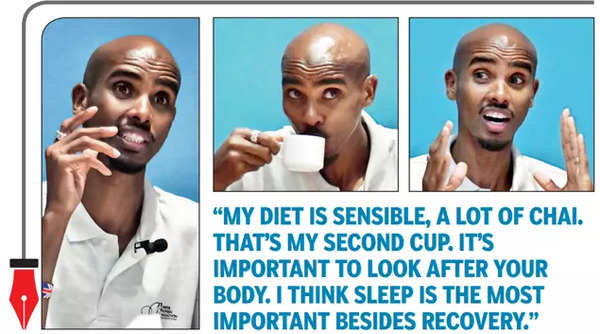
When you won your first two gold medals at the London Olympics, which of the two gave you greater satisfaction?
Probably the first one for me is the ones that, as an athlete, define you as Olympic champion. And no one could take that. And to be able to do it in front of my home crowd in London, for me, that 10,000 metres was epic. That Saturday, they called it ‘Super Saturday’ where we had myself, Jessica Ennis and Greg Rutherford where, in a 45-minute window, there were three Olympic champions on the track, and I was one of them.
In 2022, you told the BBC about how you were trafficked. Was it a very tough thing to admit? You waited pretty much until your retirement to talk about it? Is it because you didn’t want to distract yourself from your career?
It was very difficult for me because I didn’t want to be in that situation. And then for me, in school, I went to social services. The school knew, so we talked about it. Then I was moving from that environment to being somewhere else. And for me, that’s when I started to enjoy more. I was free and had that amazing career. And as I got older and had my own family, my kids were the biggest reason why I did it because they were asking me questions. ‘Where is your brother? Where is your grandma? Why can we not see them?’ When I looked at them at times, I couldn’t imagine them going through what I did. And honestly, I just wanted to be honest with them and be transparent for them. Also, for me, it was so hard to carry that with you for 30 years. I just wanted to be free.
At what point did you begin running? At what stage did you discover that you can run, and what did running do for you at that time?
I discovered it through my PE teacher (Alan Watkinson), who took me to a local club. I could always play football and run around. I was that kid who was always very active, but when I was 11, I joined the running club. In 1996, when I was 12, I started competing for the clubs. But running was what saved me. Without running, I would have struggled mentally as well as physically. Because running was a way of being free, a way of giving me things that I could control. And sometimes, you know, people go, ‘where does he get that fearless drive?’ And for me, it’s just knowing my story just made me more resilient, more grounded, hungrier, and grabbing the chance with both hands. When you get that opportunity in life, grab it with both hands and thrive.
What did you feel when it was announced that you were going to be knighted? You came from zero, almost nothing from Somaliland…
As I said, I’ve had an amazing career. Even though at times as a kid, you think, I did struggle. And now I’m not struggling. But still, I do think about the things I went through. But yet, you know, if somebody would say to you in this room, when I was a young boy, said to you — you’re going to achieve four Olympic gold medals, you’re going to be given world titles, you’re going to be knighted by Her Majesty, the Queen, I wouldn’t believe you. I would have taken one of those things. And to be recognised there because of your talents and the medals you won for your country, it’s an amazing feeling because there are things that you can’t control. To have that title, the same thing as Sir Alex Ferguson and so many great role models I had growing up, it’s incredible. It just shows you in life, anything is possible, you never know.
You made a return to track competition and spoke of wanting to defend your 10,000m Olympic title in Tokyo. But you missed the qualifying mark by 19 seconds in June 2021. You had said that the reasons you wanted to return to track were because you had missed it, and you felt that you could still win medals. How much of a disappointment or reality check was it for you to miss the bus?
It’s all about being as honest and transparent as possible. But as an athlete, when you win stuff, your mindset is different from normal people. You always think you’re good enough and you can do it. If the Olympics would have happened when it was supposed to happen (Aug 2020), I would have retired there. But then Covid happened, and the Games were delayed by a year. Then I got injured, and I found it hard. But I just didn’t want to stop there. I wanted to stop at the Olympics. I was trying to qualify, but that’s all I had. With age, the body slows down. Yes, I was disappointed, but I didn’t want to look back and say, ‘I’m so disappointed’. I was grateful to have got the opportunity to compete in my country and win this medal. It was more frustration than disappointment.
Do you think anyone can achieve the quadruple double (winning the 5000m and 10000m titles at two successive Olympics and world championships) again?
There are a lot of athletes who have won so many medals but not done what I did. It was only Lasse Virén, I believe, who did the Olympic double-double, and Kenenisa Bekele, I think, is short of one medal. But I believe he’s one of the best athletes that we will ever see in terms of long distance.
Haile Gebrselassie came close too, but not quite so. To be in the same bracket as Lasse Virén is incredible for me. No one really stands out to me that could do that in the next 10 or 15 years. Jakob Ingebrigsten is another great athlete, but he’s coming from 1500 metres to 5000 metres. But I don’t see anyone at the minute who can go 5000, 10000 metres and repeat that over an Olympic cycle. But we will see someone while we’re still alive get close or maybe even beat it.
Did you ever think of reverting to your original name, Hussein Abdi Kahin?
My mom gave me my birth name, Hussein. And one of the reasons why I named my son Hussein was because I never got a chance to call myself by that name. So, in our family, my son is Hussein. I couldn’t see myself as another Hussein because I think most people know me now as Mo. We’ll continue. My mom, though, still calls me Hussein.
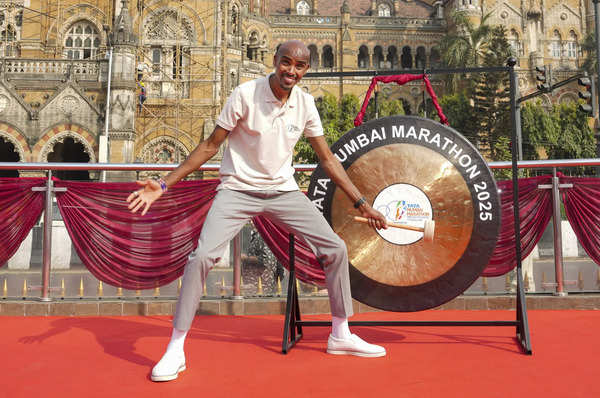
Mo Farah poses for pictures in front of Chhatrapati Shivaji Maharaj Terminus in Mumbai. (PTI Photo)
The Kenyans and Ethiopians have a galaxy of long-distance runners. Why is it? Is it because they are genetically superior? Is it the climate? Is it the high altitude?
Indeed. They can run indefinitely (laughs). It’s a combination of two elements. Firstly, it’s genetic. If you are born in that part of the world, East Africa, your frame is more petite. And then the other aspect is training and understanding that if you’re born at 10,000ft above sea level and you train against somebody who’s at sea level, you’re going to be superior because you’re accustomed to a place where there’s less oxygen.
How would you measure up to the original African legend, Kenenisa Bekele?
If I look at all the people that I raced against and think who was the strongest, I’ll probably say Kenenisa Bekele. Just for what he did on the cross country, on the track, world records, Olympic titles, world championships. He’s run what, 2.01 in the marathon. I think it’s not often talked about, but if you put all these things on a piece of paper, you probably go, wow, he’s definitely up there.
When do you think long distance or distance runners will become as popular as the sprinters? What do they lack?
We need to make it happen (laughs). It’s the lack of personalities. When I observe football, rugby or these other sports, I wonder why they receive such extensive publicity when we are running and working 10 times more intensely. It’s an individual sport, not a team event. The athlete is out there, representing their country. Personally, I aspire to see running reach new heights. I want to witness the participation numbers at the Mumbai Marathon grow annually. I want to see women, girls and people surmounting various challenges.
About your personal well-being. So how many hours do you sleep? Do you run every day; do you work out every day? What’s your diet like?
My diet is sensible, a lot of chai as you can see. That’s my second cup (points to the cup of tea in front of him), a lot of coffee. But it’s important to look after your body whether you are an athlete or not. I think sleep is the most important and recovery. I sleep about 8 to 9 hours, minimum of 7, it depends. And I will always have my watch on which give me every night’s sleep (data), how many steps. I’ll take about 10 to 15,000 steps a day, just walking, and now and then, I would go for a little jog just to clear my head.
Being a practising Muslim, how did you cope with fasting while competing?
In 2012, I really struggled because during the Olympic time, it was on that time. So, the days that I couldn’t do it, I followed up on it. But for me, each one is different. And with Ramadan, it keeps moving 10 days. So now is easier because you’re going into the winter and December time. But during 2012, it does get harder. But for me, I’m quite reserved. The days I do kind of miss, and I can’t do it, I do catch up. Honestly, one of the best feeling I had this year was being able to go to Mecca, because my dream, when I did stop, was to do that. And I did that with my wife, and it just changes you.
A lot of people in India are taking to running very late, you know in the middle age. So, if someone like that comes to you for advice, what would you tell them?
It’s hard when you start something so late, but also, wherever you start, you have to have a passion and a belief. For me, to achieve all these great things, if I didn’t have the drive, I would never have won anything. So, it’s important for people to feel in love in the moment. But running, often people go, ‘running is just…why would you run?’ But when you get the taste of running, then that running bug and that feeling of you did something great, you want to continue to go out, and you keep doing more and more.
Did you run by instinct or by strategy?
Strategy.
So, say if you were running a marathon, did you have a plan or did you run by instinct depending on what your body was telling you?
If I listened to my body each time what it was saying, I would never have won. It’s a funny thing, because the body sometimes doesn’t like being challenged. It tells you ‘Oh you’re tired’. But if you listen to that, you will be tired. It’s a bit of both.
At what stage, say in the 5000 or 10000m did you know that this is the time to accelerate and move into the next gear?
But even in the last lap, somebody could go in as hard and I knew at that point if they’re coming past me, just don’t give him more than what’s necessary, so hold them. And sometimes, you might have to go out flat out for the first bit but have something left towards the end. It’s just when you do more races, you learn about it, you understand more. And I was good at tactically just winning races really more than anything else. Because if you look back, all the things I’ve won, it’s come by tactics more than fast times or records. Because I didn’t win those titles in certain amount of record time.
Mo, your story as an athlete is marvellous and of course it is a bigger human story full of drama and emotion. The material is quite fertile for a biopic or a web series. If there is a biopic on Mo Farah, who do you think should play Mo Farah and why?
Hollywood or Bollywood? You pick Bollywood for me, I’ll pick Hollywood. It’s hard to pick, honestly. Hollywood, it would have to be Denzel Washington. If I could give back anything to people, have that character of him. He’s one of my favourite actors in Hollywood.
Every year shoes evolve, how much do you think shoe technology has been helping runners?
Yeah, as I said, shoe technology is moving so fast, it’s incredible. I remember back when, even for people competing in marathon, it took weeks, like one week, ten days to recover. Now when you do a marathon, not (just) recover, but you can walk again. I’m sure you hear some amazing stories. Like some people can’t even walk after a marathon. Now after a marathon, you can walk up the stairs, down the stairs, and that’s how technology is going.
By when do you see any athlete running the marathon under two hours?
I think it’s a matter of time. Ten-15 years.
Ten-15 years? Considering it is under 2:01 at the moment?
(Laughs) I’ll have to be a bit more cautious. But…. I don’t know. The way we are operating, because the women just run under 2:10, right? Under 2:10 is under 5-minute miling. So if you break it down and go with ‘if women can run sub-5-minute a mile, what are the men capable of? I think we might even see it sooner than we think.

